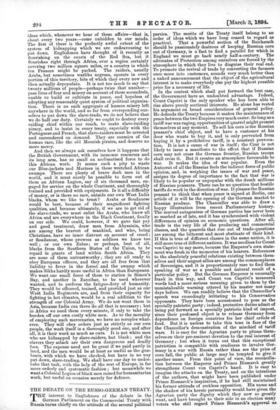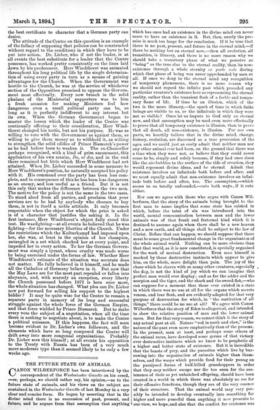THE DEBATE ON THE RUSSO-GERMAN TREATY.
rrnE interest to Englishmen of the debate in the _L German Parliament on the Commercial Treaty with Russia turns chiefly on the attitude of the several political parties. The merits of the Treaty itself belong to an order of ideas which we have long ceased to regard as practical. That a powerful section of the Reichsrath should be passionately desirous of keeping Russian corn out of Germany, is a fact to find a parallel for which in England we must go back nearly half-a-century. The advocates of Protection among ourselves are forced by the atmosphere in which they live to disguise their real end.
To promote the revival of trade by converting the farmers once more into customers, sounds very much better than a naked announcement that the object of the agricultural interest is to make everybody else pay the highest possible price for a necessary of life.
In the contest which shall put forward the best case, the Government have an undoubted advantage. Indeed, Count Caprivi is the only speaker who has been able to rise above purely sectional interests. He alone has rested his argument on broad considerations of general policy. He defends the Treaty because it makes the maintenance of peace between the two Empires very much easier. So long as a tariff war was raging, opportunities of quarrel might present themselves at any moment. To sell his corn is the Russian peasant's chief object, and to have a customer at his door who wants to buy it, and is only prevented from buying it by a prohibitive tariff, is a constant provoca- tion. It is not a cause of war in itself ; the Czar is not likely to issue a manifesto to the effect that if Russian corn may not cross the German frontier, Russian troops shall cross it. But it creates an atmosphere favourable to war. It makes the idea of war popular. Even the Autocrat of all the Russias feels the indirect force of public opinion, and, in weighing the issues of war and peace, assigns its degree of importance to the fact that war is likely to be popular or unpopular with the dumb millions of Russian peasants. There can be no question that hostile tariffs do work in the direction of war. It pleases the Russian peasant to think that when peace is signed at Berlin, one article of it will be the opening of the German market to Russian produce. The Chancellor was able to draw a happy illustration from recent Parliamentary history. The mutual antagonism of German parties has never been so marked as of late, and it has synchronised with violent differences of opinion on economic questions. After all, trade is the very life of the producing and commercial classes, and the quarrels that rise out of trade-questions are among the bitterest and most obstinate of their kind. If this is true of different classes in the same nation, it is still more true of different nations. It was needless for Count von Caprivi to say more, because the Emperor's own state- ment was fresh in the memories of his hearers. References to the absolutely peaceful relations existing between them- selves and their august allies are among the commonplaces of Sovereigns, and it is proportionately rare to find them speaking of war as a possible and natural result of a particular policy. But the German Emperor is unusually frank in this way, and Count von Caprivi's measured words had a more serious meaning given to them by the unmistakeable warning uttered by his master not many days before. We can readily believe that the Chancellor's speech was exceedingly irritating to his Conservative opponents. They have been accustomed to pose as the specially patriotic party ; indeed, protective duties admit of being put forward as a specially patriotic kind of impost, since their professed object is to release Germany from dependence on foreign countries for her chief article of food. But it is useless to take this tone in face of the the Chancellor's demonstration of the mischief of tariff wars. It is easy for the Agrarian party to plume them- selves on their pre-eminent devotion to the real interest of Germany ; but when it turns out that this exceptional patriotism is compatible with readiness to involve Ger- many in a war with Russia rather than see the price of corn fall, the public at large may be tempted to give it another name. From this point of view, the reconcilia- tion between the Emperor and Prince Bismarck greatly strengthens Count von Caprivi's hand. It is easy to imagine the attacks on the Treaty, and on the intentions of the authors, that might have been published under Prince Bismarck's inspiration, if he had still maintained his former attitude of reckless opposition. His name and the shadow of his heroic personality would have given the Agrarian party the dignity which they now so greatly want, and have brought to their side in an election many voters who still regard Prince Bismarck's approval as the best certificate to character that a German party can desire.
The attitude of the Centre on this question is an example of the fallacy of supposing that policies can be constructed without regard to the conditions in which they have to be put into action. Dr. Lieber, who if not the leader, is at all events the best substitute for a leader that the Centre possesses, has worked pretty consistently on the lines laid down by his predecessor. Herr Windthorst was animated throughout his long political life by the single determina- tion of using every party in turn as a means of gaining advantages for the Church. When the Government was hostile to the Church, he was at the service of whichever section of the Opposition promised to oppose the Govern- ment most effectually. Every new breach in the solid phalanx of the Ministerial supporters was to him a fresh occasion for making Ministers feel how dangerous even a small political party can be, so long as it is perfectly indifferent to any interest but its own. When the German Government began to master the lesson which the leader of the Centre was continually offering to their consideration, Herr Wind- thorst changed his tactic, but not his purpose. He was as willing to vote with the Government as against them, as willing to give them money as to withhold it, as willing to strengthen the solid edifice of Prince Bismarck's power as he had before been to weaken it. The ex-Chancellor perhaps recognised, with a kind of grim amusement, this application of his own maxim, Do, at des, and in the end there remained but little which Herr Windthorst had not attained. When Dr. Lieber succeeded in some measure to Herr Windthorst's position, he naturally accepted his policy with it. His command over the party has been less com- plete, and in consequence of this he has been less dangerous as an enemy, and less useful as a friend. But it is not this only that makes the difference between the two men. The motive for the policy is not the same in the two cases. To stand aloof from all parties, and proclaim that your services are to be had, by anybody who chooses to buy them, is not in itself a noble attitude. It only becomes respectable when the object for which the price is asked is of a character that justifies the asking it. In the first instance, Herr Windthorst's object fully stood this test. He was fightin g—at all events he believed that be was fighting—for the necessary liberties of the Church. Under the restrictions which the Kulturkampf had imposed upon her, she was, at least in the opinion of her champion, entangled in a net which checked her at every point, and impeded her in every action. To her the German Govern- ment was simply a tyrant, whose cruelty was made worse by being exercised under the forms of law. Whether Herr Windthorst's estimate of the situation was accurate does not matter. He fully believed in it himself, and he made all the Catholics of Germany believe in it. But now that the May Laws are for the most part repealed or fallen into abeyance, and, with scarcely an exception, every liberty the , Church possessed before 1871 is hers once more, the whole situation has changed. What plea can Dr. Lieber now put forward for selling his support to the highest bidder ? It may be quite wise for the Centre to remain a separate party in memory of its long and successful struggle against the whole force of the German Empire, and that force wielded by Prince Bismarck. But to make every vote the subject of a negotiation, when all the time there is nothing to negotiate about, is to make the Centre a political nuisance. If this happens, the fact will soon become evident to Dr. Lieber's own followers, and the elements which have so long composed the Centre will dnft away into more congenial organisations. Probably Dr. Lieber sees this himself ; at all events his opposition to the Treaty with Russia has been of a very much more moderate type than it seemed likely to be only a few weeks ago.







































 Previous page
Previous page